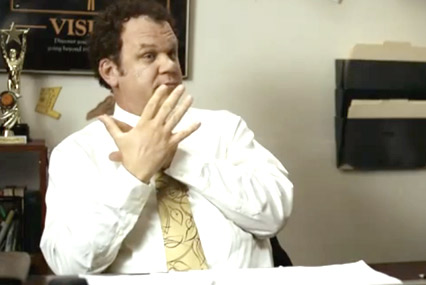Craig here with this week's Take Three. Today: John C. Reilly

Take One: Terri (2011)
The last couple of years have brought Reilly a trio of great dramedic roles. He showed real range in a slight but noteworthy career shift from his usual broader comedies to Cyrus, Carnage and Terri. The third film which is about the lonely life of an overweight high school outcast (Jacob Wysocki) was a particularly great role for Reilly. He was unassuming, believable and much more curiously sombre than in most of the roles we've seen him play to date. (He also played Tilda Swinton’s husband in We Need to Talk about Kevin last year, though his role was largely, though I'd argue unfairly, labelled as miscasting.) Playing Assistant Principal Fitzgerald here Reilly gets to balance that oddball characteristic of his – the one where he does that shouty-then-calm bafflement – with more introspective modes of expression. His first meeting with Terri, who is called to his office for wearing PJs to school, is a beautifully played example of Reilly’s ability to quickly establish a strong, unconventional personality, and then let an audience work out and appreciate what that character is all about. He’s pally one minute and almost comically aggressive the next – especially with the ‘problem’ students. He’s probably the only adult figure in these kids’ world who resembles an authority figure but who can serve it to them on a level they might understand. Watching Reilly in Terri you see just how perfectly he understands certain ‘types’ (here the hardened know-it-all with a hidden nice side) and how that understanding allows him to blend the comic and tragic aspects of his characters in a fresh manner.
Two more Reilly takes after the jump
Take Two: Step Brothers (2008)
Reilly’s certainly not averse to getting childish and breaking out his inner idiot. He and Will Ferrell pal up and play it dumb and dumber as emotionally and mentally downgraded almost-siblings in Step Brothers. Reilly may have been more effectively in control of his daft side in Walk Hard: The Dewey Cox Story, but in Step Brothers he lets his aptitude for well-observed physical tomfoolery off the leash in even more ridiculous ways. It may not be considered the zenith of his comic powers – some say that’s Walk Hard, others say Talladega Nights: The Ballad of Ricky Bobby, other still his work as Steve Brule for Tim & Eric – but he’s best when he teams up with, and plays off, a comically adept co-star. (Recall how well he and Mark Wahlberg teamed up in their parodic action movie clips in Boogie Nights and see the low-key scuffles with Seann William Scott in The Promotion.)

Here, we get a full-on house-and-garden fight over testicles rubbed on a drum kit, a mutual appreciation of Shark Week and copious instances of property destruction. And then some. Reilly is ever the watchable clown, mastering quick-fire adlibs and improvised exchanges with Ferrell. It’s neither big nor clever of course (the gags are hit and miss at best), but the goods come via Reilly’s capable verbal sparring and physical mimicking of a stroppy, emotionally-stunted teenager. Even when the material is half-hearted, Reilly unearths moments of low-grade mirth worth staying around for.
Take Three: Magnolia (2000)
Reilly and company all have a very bad day in L.A. in Magnolia, one which culminates in an event of near-biblical proportions; the rain of frogs comes as a catastrophic closure for Paul Thomas Anderson’s bruised-soul ensemble. With character rich touching clumsiness, Reilly’s lovestruck Officer Kurring pursues a romantic connection with daughter-in-distress Melora Walters. This chase weaves a sweet thread of hopefulness through this epic exploration of deathly Los Angeles mores. Reilly’s Kurring is Magnolia's designated everyman and this plot strand is what we cling onto for some respite from Tom Cruise’s cock respecting, Julianne Moore’s pharmaceutical mania and William H. Macy’s pleas for affection. Reilly is a placid, decent man, though he's ill fit for a position of authority; this crestfallen cop loses his gun and sense of control over the course of one rainy, painful day.
Reilly’s passive aura allows the film its few moments of rest. Indeed, Anderson’s erratically mobile camera becomes still and much more composed in an attempt to match this actor's calm demeanour. Magnolia gives Reilly the opportunity to build on the work he did for Anderson in Boogie Nights (where, as well as being a porn star, he was a similarly amiable guy) and Hard Eight (where his dialed-down emotion was expertly utilised) and add further depth to his CV as a character for whom the sad routine of life and lovelessness are both sourly interchangeable struggles. The restaurant date with Walters late in the film – all giddy rush and pooh-poohing of conventional first-kiss etiquette – contains some of his best, and most becoming, work as an actor.
Three more films for the taking: Dolores Claiborne (1995), The Good Girl (2002), Cirque du Freak: The Vampire's Assistant (2009)